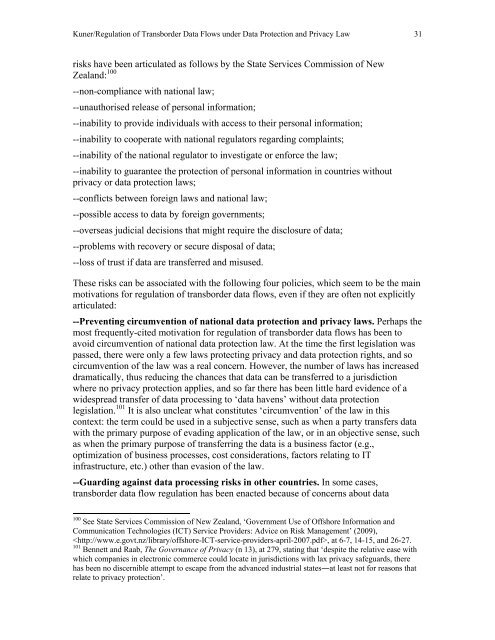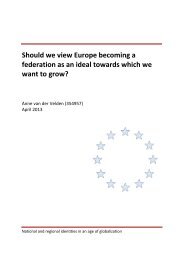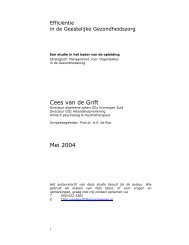Regulation of Transborder Data Flows under ... - Tilburg University
Regulation of Transborder Data Flows under ... - Tilburg University
Regulation of Transborder Data Flows under ... - Tilburg University
Create successful ePaper yourself
Turn your PDF publications into a flip-book with our unique Google optimized e-Paper software.
Kuner/<strong>Regulation</strong> <strong>of</strong> <strong>Transborder</strong> <strong>Data</strong> <strong>Flows</strong> <strong>under</strong> <strong>Data</strong> Protection and Privacy Law 31<br />
risks have been articulated as follows by the State Services Commission <strong>of</strong> New<br />
Zealand: 100<br />
--non-compliance with national law;<br />
--unauthorised release <strong>of</strong> personal information;<br />
--inability to provide individuals with access to their personal information;<br />
--inability to cooperate with national regulators regarding complaints;<br />
--inability <strong>of</strong> the national regulator to investigate or enforce the law;<br />
--inability to guarantee the protection <strong>of</strong> personal information in countries without<br />
privacy or data protection laws;<br />
--conflicts between foreign laws and national law;<br />
--possible access to data by foreign governments;<br />
--overseas judicial decisions that might require the disclosure <strong>of</strong> data;<br />
--problems with recovery or secure disposal <strong>of</strong> data;<br />
--loss <strong>of</strong> trust if data are transferred and misused.<br />
These risks can be associated with the following four policies, which seem to be the main<br />
motivations for regulation <strong>of</strong> transborder data flows, even if they are <strong>of</strong>ten not explicitly<br />
articulated:<br />
--Preventing circumvention <strong>of</strong> national data protection and privacy laws. Perhaps the<br />
most frequently-cited motivation for regulation <strong>of</strong> transborder data flows has been to<br />
avoid circumvention <strong>of</strong> national data protection law. At the time the first legislation was<br />
passed, there were only a few laws protecting privacy and data protection rights, and so<br />
circumvention <strong>of</strong> the law was a real concern. However, the number <strong>of</strong> laws has increased<br />
dramatically, thus reducing the chances that data can be transferred to a jurisdiction<br />
where no privacy protection applies, and so far there has been little hard evidence <strong>of</strong> a<br />
widespread transfer <strong>of</strong> data processing to ‘data havens’ without data protection<br />
legislation. 101 It is also unclear what constitutes ‘circumvention’ <strong>of</strong> the law in this<br />
context: the term could be used in a subjective sense, such as when a party transfers data<br />
with the primary purpose <strong>of</strong> evading application <strong>of</strong> the law, or in an objective sense, such<br />
as when the primary purpose <strong>of</strong> transferring the data is a business factor (e.g.,<br />
optimization <strong>of</strong> business processes, cost considerations, factors relating to IT<br />
infrastructure, etc.) other than evasion <strong>of</strong> the law.<br />
--Guarding against data processing risks in other countries. In some cases,<br />
transborder data flow regulation has been enacted because <strong>of</strong> concerns about data<br />
100 See State Services Commission <strong>of</strong> New Zealand, ‘Government Use <strong>of</strong> Offshore Information and<br />
Communication Technologies (ICT) Service Providers: Advice on Risk Management’ (2009),<br />
, at 6-7, 14-15, and 26-27.<br />
101 Bennett and Raab, The Governance <strong>of</strong> Privacy (n 13), at 279, stating that ‘despite the relative ease with<br />
which companies in electronic commerce could locate in jurisdictions with lax privacy safeguards, there<br />
has been no discernible attempt to escape from the advanced industrial states―at least not for reasons that<br />
relate to privacy protection’.

















